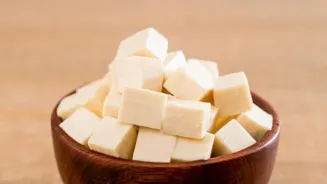Discover the hidden powers of paneer! Find out why this favorite cheese is a superfood in 7 compelling ways
Paneer, that soft, milky cheese we all love in our Indian curries and snacks, is more than just
a delicious treat. It's a nutritional powerhouse packed with goodness that can seriously boost your health.

You might be surprised to learn just how many benefits are hiding in your favourite paneer tikka or palak paneer. Forget those fancy imported superfoods, your desi paneer is right here, ready to make you healthier and stronger!
Let's explore seven amazing reasons why paneer deserves superfood status.
Paneer is a key protein source for vegetarians, aiding muscle repair and growth
First off, paneer is a fantastic source of protein. Protein is the building block of our bodies, essential for muscle repair, growth, and overall strength. For vegetarians, finding good sources of protein can sometimes be a challenge, but paneer steps up to the plate perfectly.
A good serving of paneer can provide a significant chunk of your daily protein requirements, keeping you feeling full and energized throughout the day. This is especially important for those who are active or trying to build muscle mass.
So next time you're planning your meals, remember to include paneer for a protein punch!
Paneer is rich in calcium for strong bones
Secondly, paneer is loaded with calcium, which is crucial for strong bones and teeth. Osteoporosis, a condition that weakens bones, is a growing concern, especially as we age. Getting enough calcium through your diet is essential for preventing this.
Paneer provides a readily available source of calcium, making it a great addition to your daily meals, especially for children and older people. Think of it as a tasty way to invest in your bone health!
Paneer with CLA for weight management and immunity boost
Thirdly, paneer contains conjugated linoleic acid (CLA). Even though it sounds a little scary, it could potentially help with weight management and control your weight. Studies have shown that CLA may help in burning fat and also increases immunity.

While more research is there in this area, including paneer in a balanced diet could be a simple way to give yourselves a potential advantage in your goal for weight loss. That cheese will not make you fat, consume in moderate portions and you are good to go.
Paneer is rich in Vitamin D for bone health and immunity boost
Fourth, paneer is a good source of Vitamin D, especially if it is obtained from cow milk. Vitamin D is essential for absorption of calcium into the body and helps with bone health. Vitamin D is also known to boost the mood and improve immunity.
So if you want your daily dose of “sunshine vitamin”, it’s always recommended to take your sunshine vitamin from paneer and other food sources.
Paneer promotes healthy blood pressure & heart health
Fifth, paneer contains potassium which is important to regulate blood pressure. Potassium helps with counteracting the effect of sodium (salt) and helps with maintain healthy blood pressure levels. Intake of potassium can prevent the risk of strokes and heart attacks.

So including paneer in your diet will make you live longer.
Paneer benefits gut health with probiotics, aids digestion
Sixth, Paneer is a friend to your gut. It contains good amount of probiotics which aid digestion and improve gut health. Eating paneer will help your gut bacteria and prevent bloating and constipation. So next time if you have tummy issues, reach out for paneer.
Paneer: A Superfood with 7 Key Health Benefits
So, there you have it! Seven convincing reasons to embrace paneer as a superfood. It's packed with protein, calcium, CLA, Vitamin D, potassium, probiotics, and promotes overall good health.
From delicious curries to tasty snacks, there are countless ways to incorporate this nutritional powerhouse into your daily diet. So go ahead, indulge in your favourite paneer dishes and reap the amazing health benefits this humble cheese has to offer! Your body will thank you for it.
AI Generated Content. Glance/InMobi shall have no liability for the content













